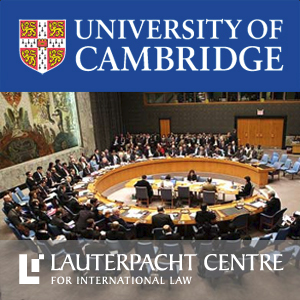Hersch Lauterpacht Memorial Lectures 2013-2014 'International Law and the Art of Peace. Part II: Revitalizing the Practice of International Dispute Resolution' by Professor Mary Ellen O'Connell
Duration: 1 hour 3 mins
Share this media item:
Embed this media item:
Embed this media item:
About this item

| Description: |
The Hersch Lauterpacht Memorial Lecture is an annual lecture series given in Cambridge to commemorate the unique contribution to the development of international law of Sir Hersch Lauterpacht. These lectures are given annually by a person of eminence in the field of international law and a revised and expanded version of the lectures is usually published in the Hersch Lauterpacht Lecture Series by Cambridge University Press. The lecture comprises three parts, delivered on consecutive evenings, followed by a Q&A session on the fourth day.
The 2013-2014 Hersch Lauterpacht Memorial Lecture series, entitled 'International Law and the Art of Peace' was delivered at the Lauterpacht Centre for International Law, University of Cambridge, by Professor Mary Ellen O'Connell, Robert and Marion Short Professor of Law and Research Professor of International Dispute Resolution at the Kroc Institute for Peace Studies, University of Notre Dame , from Monday 17 to Thursday 20th February 2014. This part, entitled 'Revitalizing the Practice of International Dispute Resolution' is the second of the three lectures given. |
|---|
| Created: | 2014-02-28 12:18 |
|---|---|
| Collection: | LCIL International Law Seminar Series MOVED |
| Publisher: | University of Cambridge |
| Copyright: | University of Cambridge |
| Language: | eng (English) |
| Keywords: | international law; dispute resolution; Sir Elihu Lauterpacht; |
| Abstract: | The prohibition on resort to military force may well be falling behind the advancement of other peremptory norms of international law such as the prohibitions of torture, slavery, and genocide. These Lectures take up this issue, aiming to reawaken commitment to preserving the peace through law. The approach will be through theory—not just dominant positivism but natural law, process theory, and aesthetic theory.
Part II. Revitalizing the Practice of International Dispute Resolution: Process theory holds promise for reigniting interest in methods of dispute resolution as rational alternatives to the use of military force. Sir Elihu Lauterpacht’s writing, teaching, and practice will provide primary material for the discussion. |
|---|---|

